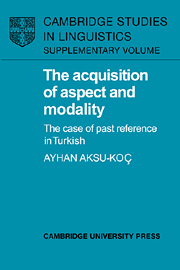Book contents
- Frontmatter
- Contents
- List of figures
- List of tables
- Acknowledgements
- Symbols and abbreviations
- PART I TENSE, ASPECT AND MODALITY IN ACQUISITION
- PART II DEVELOPMENT OF PAST REFERENCE IN TURKISH: FROM ‘PERFECT’ ASPECT TO ‘EVIDENTIAL’ MODALITY
- PART III CONCLUSIONS AND GENERAL IMPLICATIONS
- 9 Conclusion
- Appendix A
- Notes
- Bibliography
- Subject index
- Name index
9 - Conclusion
Published online by Cambridge University Press: 23 September 2009
- Frontmatter
- Contents
- List of figures
- List of tables
- Acknowledgements
- Symbols and abbreviations
- PART I TENSE, ASPECT AND MODALITY IN ACQUISITION
- PART II DEVELOPMENT OF PAST REFERENCE IN TURKISH: FROM ‘PERFECT’ ASPECT TO ‘EVIDENTIAL’ MODALITY
- PART III CONCLUSIONS AND GENERAL IMPLICATIONS
- 9 Conclusion
- Appendix A
- Notes
- Bibliography
- Subject index
- Name index
Summary
One major aim of developmental research is to trace the successive phases of acquisition of knowledge in a given domain with particular attention to whether, and to what extent, the behavioral patterns in question are innate or learned. Study of language from the developmental perspective similarly raises these issues. However, as was pointed out at the outset, research in the field has clearly revealed that a one-sided approach to the question, such as the proposal for an innately structured LAD in the earlier Chomskyan tradition, or the view of purely associative learning in the classical behavioristic school, has to be abandoned in favor of a more interactionistic position which takes into account both innate-structural and environmental-learning factors. The necessity for such an interactionist perspective is particularly apparent if it is recognized that language, the object domain under study, is an intersubjectively constituted product of the human mind. Furthermore, for an adequate account of language structure and its acquisition, the functions which such structures realize in context at different points in development have to be delineated. In other words, an understanding of the discovery procedures utilized by a child can be achieved if they are viewed in the social interactional context of discourse. The theoretical grounds for such an approach are best provided by the Piagetian and the Vygotskyan perspectives. These theories emphasize, respectively, children's constructive activity in the course of acquisition of knowledge, and the primacy of social interaction as a general context for development.
- Type
- Chapter
- Information
- The Acquisition of Aspect and ModalityThe Case of Past Reference in Turkish, pp. 173 - 208Publisher: Cambridge University PressPrint publication year: 1988

